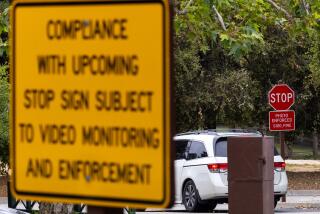Bell activists call for probe of police towing
- Share via
Some community activists in Bell are demanding an independent investigation into complaints that Bell police unfairly towed and impounded cars.
According to Bell budget documents reviewed by The Times on Monday, the city generated at least $652,000 in revenue last fiscal year from towing-related expenses. The vast majority of that sum — $574,000 — was from what the document described as “unlicensed driver release” revenue.
It’s unclear exactly where that money came from. But some Bell residents have complained that police officers have pulled over motorists and towed their vehicles if the drivers don’t have licenses. Bell has a large immigrant population and is home to many illegal immigrants.
Residents have also complained about police being too aggressive about towing parked cars.
The city documents show that revenue from the unlicensed driver release fee has increased in recent years. In fiscal 2004-05, the fee generated about $450,000.
The documents also make reference to a DUI “cost recovery” generating nearly $447,000 last year. But it’s unclear whether that revenue was generated by organized DUI checkpoints or routine police patrols.
The issue of DUI checkpoints and illegal immigrants has been contentious statewide. Many without driver’s licenses have their cars confiscated, even if they are not drunk. The issue of checkpoints and aggressive towing of parked cars was a point of contention in nearby Maywood.
Cristina Garcia, a member of the Bell Assn. to Stop the Abuse, said an outside entity needs to look into the charges. “They’re paying up to $500 in towing and storage fees,” Garcia said. “The impound is something in the range of $350 and the towing is $150.”
A former Bell police officer who filed a wrongful-dismissal suit against the city last week complained to city leaders in 2009 that the Police Department was towing cars to generate revenue.
James Corcoran wrote to an attorney for the city that he could not “in good faith, support our departmental vehicle impound policy.”
“The majority of the vehicles seized by this department are not, in my opinion, a danger to the communitycare function,” he wrote.
The documents were included in allegations he made to state and local officials.
ruben.vives@latimes.com
richard.winton@latimes.com
More to Read
Sign up for Essential California
The most important California stories and recommendations in your inbox every morning.
You may occasionally receive promotional content from the Los Angeles Times.















